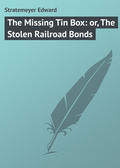
Stratemeyer Edward
Dave Porter on Cave Island: or, A Schoolboy's Mysterious Mission
CHAPTER XIII – DARK DAYS
Oliver Wadsworth listened to Dave’s words with deep interest. Then he shrugged his shoulders.
“That sounds pretty good, Dave, were it not for one thing. Do you imagine that two masked fellows, bent on blowing open safes, would stop to light and smoke cigarettes?”
“I think Merwell and Jasniff would, Merwell especially. When Link is nervous the first thing he does is to take out a cigarette and light it. It’s an almost unconscious habit with him.”
“This story about what that doctor said interests me most of all,” went on the manufacturer. “I think we ought to have a talk with him. For all we know, he may be one of the guilty parties.”
“No, I don’t think he is that kind. Besides, he was very angry at Merwell and Jasniff and wanted nothing more to do with them.”
“The detective who was here thought he had a clew against a professional bank burglar. Personally, I think this looks more like the work of professionals than fellows just out of school,” said the manufacturer; and there, for the time being, the matter rested.
During the day two more detectives appeared and went over the ground, as the other officials had done. One thought he saw in the robbery the hand of a criminal known as Red Andrews.
“This is just the way Red Andrews would go at a job,” said the detective. “He was sent up for robbing a private banker some years ago, and he got out two months ago. He was in New York – I saw him on Fifth Avenue, not far from the Carwith mansion. He may have heard about the jewels there. I am going to look for him.” And he departed on a hunt for Red Andrews.
It was not until two days later that Roger came back to Crumville. His face showed his disappointment.
“Such mean luck!” he exclaimed, when he met Dave, Phil, and Ben. “I went to four towns, looking for Hooker Montgomery, and at last I found out that he had left the east several days ago.”
“Where did he go to?” questioned our hero.
“The folks I met couldn’t tell exactly, but they thought to visit a rich aunt in the far west.”
This was a great disappointment, for they had hoped to learn much more concerning the plans of Jasniff and Merwell, from the fake doctor.
“We might send him a letter, to his last residence. Maybe the post-office authorities will forward it,” suggested Phil.
“I did that,” answered the senator’s son. “I told him that I wanted to hear from him at once, and that it would be money in his pocket to write or to telegraph to me. I didn’t mention your name, Dave, for I thought he might hear of this robbery and get suspicious.”
It was ideal weather for skating and sleighing, but none of the young folks at the Wadsworth mansion felt like going out for fun. All could see that the older folks were much worried, and consequently, they were worried, too.
“Oh, Dave, what if those jewels are never recovered?” said Laura to her brother, when they were alone. “It will just about ruin Mr. Wadsworth, Uncle Dunston says.”
“Let us hope for the best, Laura.”
“I heard you and the other boys talking about Nick Jasniff and Link Merwell.”
“Yes?”
“Do you really imagine they had something to do with it?”
“Yes, I think so, and so do Phil, Ben, and Roger. But the detectives and Mr. Wadsworth think the work was done by professionals. They don’t think that fellows like Nick and Link would be equal to the job.”
“But if you think Merwell and Jasniff guilty, why don’t you go after them and find out?”
“We don’t know where they are.”
“Aren’t they with their folks?”
“No.”
“Are you sure?”
“Yes. The Jasniffs are traveling aboard and Mr. Merwell is in Philadelphia. We sent to Mr. Merwell – through an outsider – and learned that he didn’t know where Link was just now, said he had written that he was going on a tour south for the winter. My private opinion is that Mr. Merwell finds Link hard to manage and is glad to get rid of him.”
“Do you suppose he did go south?”
“He might – after this affair here.”
“They didn’t say what part of the south he went to?”
“They said Florida. But Florida is pretty big, you know,” and Dave smiled faintly.
“Jessie is awfully downcast over this, and so is Mrs. Wadsworth – in fact, we all are.”
“I know it, Laura.” Dave drew a long breath. “It’s awfully hard to sit still and do nothing. I imagine Mr. Wadsworth can’t sleep for thinking of the affair.”
“I heard Mrs. Wadsworth talking last night to him. I didn’t mean to listen, Dave, but before I could get away I heard her say that if it was necessary she would give up this house to live in and move to a smaller place! Think of it! Why, her very heart is set on this house and these fine grounds! And Jessie thinks the world of them, too!”
“It would be awfully hard if they did have to give them up, Laura.”
“Dave, can’t father or Uncle Dunston help them, if they need help?”
“They have helped Mr. Wadsworth already – loaned him twenty thousand dollars so that he could put that new addition to the works. They also indorsed his note covering the safe return of the jewels. If those jewels aren’t gotten back, and Mr. Wadsworth can’t make good on that note, father and Uncle Dunston will have to pay the money.”
“All of it?”
“As much as Mr. Wadsworth can’t pay. And the worst of the whole matter is, Laura, just at present father and Uncle Dunston have their ready money tied up in such a manner that they can’t get hold of it excepting at a great loss. Oh, it certainly is a terrible state of affairs!” And Dave shook his head, gravely.
During that week Ben had Shadow Hamilton and Buster Beggs visit him. Of course, the new arrivals had to hear all about the robbery, and they came over with Ben to call on the other boys, and on the girls.
“This is fierce!” was Buster’s comment. “And Ben says you rather suspect Merwell and Jasniff,” he added, in a whisper.
“We do, but don’t say anything to any outsiders about it,” answered Dave.
“Say, that puts me in mind of a story,” said Shadow. “A little girl once – ”
“Wow! Cut it out, Shadow!” burst out Phil.
“Stories don’t go with robberies,” supplemented Roger.
“Let him tell it,” put in Dave, with a faint smile. “It will relieve his mind, and I guess I need a little fun to brace me up – I’ve been so depressed lately.”
“This isn’t so very much of a story,” went on Shadow, as all looked at him. “Dave telling Buster not to let outsiders know put me in mind of it. Once the mother of a little girl told her that her uncle had been naughty and had been put in prison for it. Said the mother, ‘Now, Lucy, don’t tell anybody.’ So Lucy went out to play and pretty soon, when she had all her companions around her she said, ‘What do you think my ma said? She said that when anybody has an uncle in prison, like my uncle is, you mustn’t tell anybody. So I’m not going to tell a single person!’”
“Well, I guess the boys know what I mean,” said Dave, after a short laugh. “I want you to keep this to yourselves. Don’t spread it any further. It may be that I am mistaken, and if so, and Merwell and Jasniff heard of what I have said, they would come down on me like a ton of bricks – and I’d not blame them.”
In the afternoon, urged by Mrs. Wadsworth, the boys went skating, taking the girls with them. On the ice they met Nat Poole, but the money-lender’s son did not speak to them, indeed he did his best to keep out of their way.
“He hasn’t forgotten New Year’s Eve,” said Ben. “He had better keep his distance, unless he wants to get into more trouble.”
“Wonder what he thinks of the robbery?” mused Dave.
“We might get Buster to pump him,” suggested Phil. “He is on pretty good terms with Nat, – that is, they are not open enemies.”
Buster was appealed to and he readily agreed to do the “pumping,” provided the money-lender’s son had anything to say. He skated off by himself and then threw himself in Nat’s way, and was gone the best part of half an hour.
“Well, did you learn anything?” queried Roger, when the stout youth returned.
“I guess I did!” cried Buster. “Say, I think Nat Poole is about as mean as they make ’em!” he burst out. “And he hasn’t a grain of good, hard common-sense!”
“What did he say?” demanded Phil.
“Oh, he said a lot of things, about the robbery, and about the Wadsworths and the Porters. First he said he didn’t believe the jewels were nearly as valuable as Mr. Wadsworth represented them to be, and the manufacturer was kicking up a big fuss just as a sort of advertisement. Then he said there was a report that Dave had been seen in front of the works just a few minutes before the explosion, and that that looked mighty suspicious to him.”
“The mean fellow!” muttered Roger.
“I told him that you and Roger were going to the Wadsworth house at the time, and were home when the watchman telephoned, but he only tossed his head as if he didn’t believe a word of it, and said he guessed Dave could tell something if he was of a mind to talk.”
“If that isn’t Poole to a T!” cried Phil.
“If I were you, Dave, I’d punch his head for him,” was Shadow’s advice.
“That wouldn’t do any good,” said Ben. “You can’t stop Nat from talking any more than you can stop water from running out of a sieve.”
“Which puts me in mind of another story,” burst out Shadow, eagerly. “Once two men – ”
“Oh, Shadow, another?” cried Buster, reproachfully.
“I know that story – it’s moss-covered with age,” announced Roger.
“What is it?” demanded the story-teller of Oak Hall.
“Two men – bet – carry water in a sieve – bet taken – water frozen. Ha! ha! Shadow, I got you that time.”
“Well, it’s a good story anyway,” answered Shadow, ruefully.
“I shan’t attempt to stop Nat unless he makes some direct accusation,” said Dave, calmly. “What would be the use? It would only make matters worse.”
“If you took notice of what he says, some folks would begin to think there was something in it,” said Phil. “Yes, better drop Nat. He isn’t worth bothering about, anyway. Just the same, it is mean for him to speak in this fashion.”
“He wouldn’t be Nat Poole if he didn’t,” retorted Roger.
Despite this incident, the boys and girls managed to have a good time on the ice, and for an hour or two Dave forgot his troubles and those of his friends.
“What are you going to do for the rest of the vacation, Dave?” said Roger, that evening. “You know you promised to come to my home.”
“Yes, and you promised to visit me, too,” added Phil. “You haven’t been to our house in a long time.”
“To tell the truth, I haven’t the heart to go anywhere,” answered Dave, soberly. “I guess I had better stay here and see if something doesn’t turn up.”
“Well, I can’t blame you,” said the senator’s son, and Phil said the same.
CHAPTER XIV – OFF FOR THE SOUTH
Two days later, when Roger was packing up, getting ready to return home, he received a letter from Luke Watson that filled him with interest. Luke had gone to St. Augustine, Florida, to join his folks, who were spending the winter there.
“Here’s news!” burst out the senator’s son, as he came rushing to Dave and Phil with the epistle. “This letter is from Luke Watson, you know his folks are in Florida. Well, on his way to St. Augustine, Luke stopped for a day at Jacksonville. Listen to what he says:
“‘I was walking down one of the main streets of Jacksonville, looking into the shop windows, when what do you think? I saw Link Merwell and Nick Jasniff. You could have knocked me over with a feather, for I hadn’t imagined that they were anywhere near. They were nattily dressed and each carried a small valise, and they were buying caps and some other things for a sea voyage. I went into the shop and called to them, and my! both of them jumped as if they were shot, and Merwell got so pale I thought he was going to faint. I said “Hello,” but they didn’t answer to that, and Jasniff at once wanted to know if I was alone. When I told him I was he seemed mightily relieved, and Merwell looked relieved, too. They wanted to know what I was doing there and I told them. Then I asked what they were doing, but I couldn’t get any straight answer. Merwell started to say something about going to sea, but Jasniff stopped him short, and said they guessed they would go back to New York, where they had come from.
“‘It was awful funny – they positively looked scared to death, and while they were talking to me they looked over my shoulders, as if on their guard against somebody. I asked them what they had been doing since they left Rockville, and they said not much of anything, just traveling around. They seemed to have plenty of money, for just as I went into the shop I saw Merwell pay for something from a big roll of greenbacks.
“‘After I left them, I got a bit curious about the pair, and so I watched them come from the shop and walk down to one of the docks and go aboard a big four-masted schooner. I hung around a little and pretty soon they came from the schooner and went up to one of the big hotels, and there I lost sight of them. Each had his little valise with him, but they weren’t big enough for much clothing. My, but they were scared! I fancy they thought I might pitch into them for the mean things they did in the past. But I didn’t want to start any row.’”
“Is that all he says?” demanded Dave, after the senator’s son had finished.
“That’s all he says about Merwell and Jasniff and their doings.”
“Doesn’t he mention the name of that schooner, or the hotel?” asked Phil.
“No.”
“Did you say Luke was going to Jacksonville?” asked our hero.
“Yes, his whole family are down there.”
“Then I could telegraph to him and he could give me the name of the hotel, and of the schooner.”
“Dave, what do you make out of this?” demanded the senator’s son.
“I make out of it that Merwell and Jasniff are guilty!” burst out Dave. “They went from here to Florida, and now they have either gone to sea, or are going, as soon as that schooner sails. Do you notice what Luke says about their being scared almost to death when they saw him? They evidently thought some of us, or the officers of the law, were with him.”
“And the little valises!” burst out the shipowner’s son. “Perhaps they contain the jewels!”
“Would they be foolish enough to carry them around like that?” questioned Roger. “Wouldn’t they hide them?”
“They may be looking for some good hiding-place, or some place where they can sell them,” answered Dave. “Remember, Jasniff and Merwell are green at this business – they wouldn’t go at it like professionals. If they were professionals, they wouldn’t have acted so scared.”
“That is true. What will you do, tell Mr. Wadsworth of this?”
“I think I’ll tell my father and my Uncle Dunston first. Mr. Wadsworth doesn’t place much credit in the story of Merwell and Jasniff’s guilt. He thinks the detectives are on the right track.”
“Well, possibly they are,” admitted Phil. “But I must say, this looks mighty suspicious to me.”
“I have half a mind to take matters in my own hands and run down to Jacksonville,” went on our hero. “Who knows but what I might find Merwell and Jasniff? If I did, I could stop them and make them give an account of themselves by making that old charge of abduction against them, and that charge of having used my name.”
“Say, that’s an idea!” cried Roger. “And say, I’d like to go with you.”
“So would I,” added Phil. “We might go down in one of my father’s ships.”
“Too slow, Phil – the limited express for this trip,” answered Dave. “But I must talk it over with dad first,” he added.
“We have got over three weeks before school opens again,” pursued the senator’s son. “We could go down to Florida and back easily in that time.”
Dave’s father had gone to New York on business, but came home that evening. In the meantime a telegram was sent to Luke Watson, asking for the name of the hotel, at which Merwell and Jasniff had stopped, and of the schooner.
Dave’s father and his uncle listened closely to what he had to tell, and to the reading of the letter from Luke Watson. They talked the affair over for an hour with the boys.
“You may be right, boys,” said Mr. Porter, at last. “And it may be a good plan to follow those rascals up. But I don’t think I would bother Mr. Wadsworth about it. He received a telegram from one of the detectives, and the officer is more sure than ever that he is on the right track. He caught Red Andrews pawning a fair-sized diamond, and he thinks the gem is from the Carwith collection.”
“Can’t he make Red Andrews confess?” asked Dave.
“Unfortunately the rascal got away when on the way to the police-station. But the detective feels he can soon round him up again.”
Dave looked thoughtfully out of the window and tapped the table with his fingers.
“You still think Merwell and Jasniff guilty?” remarked his uncle, with a smile.
“Yes, Uncle Dunston. After what Hooker Montgomery said, I’ll think them guilty until somebody proves otherwise.”
“Then I tell you what I’ll do, boys,” said Dunston Porter. “I’ll take a trip down to Florida with you and look into this matter. I’d rather be on the move than sitting still waiting for something to turn up.”
“Will you go?” cried Dave, eagerly.
“I will.”
“When?”
“As soon as you wish, and we can get train accommodations.”
“Hadn’t we better wait until we hear from Luke?” suggested Roger.
“No, let us get off at once!” exclaimed Dave. “If he sends word after we are gone, it can be forwarded to us.” And so it was arranged.
Great was the surprise of the Wadsworths and of Laura when the boys and Dunston Porter announced that they were going to start for Florida the next morning.
“Why, Dave?” asked Jessie. “Why are you going in such a hurry?”
“Oh, I hardly care to tell, Jessie,” he answered. “It may prove only a wild goose chase.”
“It is about the missing jewels?”
“Yes.”
“Then you are after Merwell and Jasniff.”
“Yes, but please don’t tell any outsiders.”
“Oh, Dave, don’t get into any trouble!” cried the girl, as she clung to him. “They are such bad fellows! You know what they have done to you in the past!”
“I am not afraid of them.”
“Oh, I know how brave you are, Dave! But – but don’t let them harm you – for my sake, please!” And then the tears came into her eyes and she hid her face on his arm.
“There! there! don’t worry!” he said, as he bent over her, and then he kissed her forehead. “We’ll be back before long,” and he gave her a little hug. Then the others came in.
Laura was also worried, but glad that her uncle would be along. She helped Dave to pack his suit-case. Phil and Roger also packed up, and sent word home regarding the proposed trip. As my old readers know, all the boys were well-to-do, so the expenses did not bother them.
At breakfast time the following morning came a telegram from Luke Watson. It read as follows:
“The hotel was the Castor. Think schooner was the Emma Brown, or Black, or Jones. Common name.”
“Well, that isn’t very definite, but it is something to work on,” remarked Dunston Porter.
Soon the party of four were ready to start. There was a general hand-shaking and also a few kisses.
“Well, have a good time, even if you don’t catch those fellows,” said Mrs. Wadsworth.
“Keep out of trouble,” warned Laura.
“Yes, yes, don’t let them harm you,” pleaded timid Jessie.
“And let us hear from you often,” said Mr. Porter.
“I don’t know what to say about this,” said Oliver Wadsworth, shaking his head, slowly. “But if you do get on the track of those jewels, leave no stone unturned to get them.”
“Leave that to me, Mr. Wadsworth,” said Dunston Porter. “If we find those young men have the gems – or had them – we’ll get them back, never fear.” And he spoke in a tone that showed he meant what he said.
They went to the depot in the family sleigh. Ben had heard of their going away and was there to see them off. Soon the train rolled in that was to carry the travelers to New York City.
“Good-by!” cried the boys, as they clambered aboard the car.
“Good-by!” called Ben. “I wish you luck.” And then the girls waved their hands, and the train moved off, slowly at first and then faster and faster, until Crumville was left behind.
“It’s a great trip they are taking,” said Ben, to Laura and Jessie. “Wish I was going along.”
“Why didn’t you go?” questioned Laura.
“Oh, I’ve got some things to do at home,” answered Ben. He did not care to add that his father did not wish to stand the extra expense. Mr. Basswood was fairly well-to-do, but thought he was spending enough on his son by sending him to boarding-school.
The sleigh was about to drive off when the station agent came running out, waving a yellow envelope.
“Is Mr. Wadsworth here?” he questioned, of Jessie.
“No, Mr. Mack, my father went to business. What is it, a telegram?”
“Yes, – something very important too.”
“Then give it to me and I will take it to him at once.”
“I could send it, but – ”
“Never mind. Here, I will sign for it,” and Jessie did so. Then the whip cracked and the horses started for the jewelry works on a gallop.
When Jessie handed the telegram to her father he opened it and read the contents eagerly. His face lit up.
“This is good news!” he cried. “Good news! I must go to Boston at once.”
“Have they found the jewels?” questioned his daughter.
“The detective thinks he has located them. Yes, I must go at once.” And Mr. Wadsworth hurried off to prepare for the journey.







